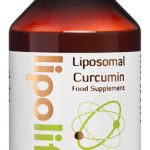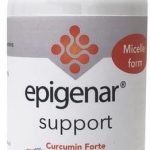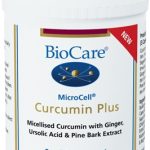Spices… what would we do without them? How bland would our food be without them as ingredients? Take, for instance, a curry without turmeric – a yellowy-orange spice that’s a member of the ginger family – what would the impact of a curry be without it? That said, spices like turmeric do far more than merely flavour our food; consumption of them do our health a great deal of good too. For example, the highly active phytochemical in turmeric that’s curcumin (which, in fact, is what gives that spice its colour) is enormously beneficial to practically every part of our bodies. Yes, really. Indeed, so inexhaustible are the curcumin health benefits that you might want to consider introducing it into your diet right now – here are just six of its major benefits:
-
Aids gut health
First up then, while playing a critical role in stimulating the gall bladder to generate and release bile1 (a fluid produced by the liver that aids the digestion of lipids – fats – in the small intestine), curcumin also eases discomfort caused by stomach ulcers because it inhibits stomach acid secretion as well as the activity of pepsin (a digestive enzyme)2.
-
Combats autoimmunity – and autoimmune-related conditions
Research has found that curcumin is adept at ameliorating the effects of multiple sclerosis (MS), rheumatoid arthritis, psoriasis and inflammatory bowel disease (IBD), all of which are either accepted as autoimmune diseases/ conditions or are strongly tied to autoimmunity3. Indeed, in terms of helping to treat IBD4, curcumin appears to be effective in aiding remission in those with inactive ulcerative colitis5, while for sufferers of rheumatoid arthritis, the phytochemical (in combination with the non-steroidal anti-inflammatory drug diclofenac) showed high efficacy6. And, if that’s not enough, it appears to help protect against autoimmune diabetes too7.
-
All the ‘anti’s – anti-viral, anti-bacterial and anti-fungal
Curcumin can also play an important role in combating infections because of its innate capacity to activate the body’s vitamin D (or calcitriol) receptor protein. Moreover, in anti-viral terms, it helps to combat influenza, adenovirus, coxsackievirus and HIV, as well as reduce hepatitis C gene expression8. Meanwhile, operating as an anti-fungal agent, curcumin (when combined with the alkaloid piperine, a common ingredient in traditional medicine) works effectively against the yeast Candida alcibans bacteria; so often harmful to the gut9. And, when putting its anti-bacterial hat on, it helps protect against septicaemia; as proved by a study on mice, in which subjects exposed to Vibrio vulnificus (a pathogenic bacteria responsible for cholera) experienced a reduction in mortality rates10.
-
Helps treat obesity and diabetes
It’s also been proved through research that curcumin, in bioavailable forms, can considerably contribute to weight loss in overweight people11. And when it comes to treating diabetes, the phytochemical’s capable of lowering blood sugar levels thanks to it stimulating insulin secretion from pancreatic cells12 and preventing insulin resistance. Moreover, it appears to drive up cardiovascular function while driving down oxidative stress in diabetic patients13, in addition to impeding obesity-induced inflammation14. Furthermore, curcumin can help reduce the chance of prediabetes evolving into type-2 diabetes and, at the same time, aid in the improvement of the overall functioning of pancreatic cells15.
-
Fights oxidative stress and is anti-inflammatory
As noted already, the chemical possesses anti-inflammatory qualities; so much so, in fact, that it’s a more powerful anti-inflammatory agent than either of the over-the-counter synthetic treatments that are aspirin and ibuprofen – not least because it inhibits the chemokine interleukin 8 (IL-8) in lung cells16. Indeed, it appears its efficacy here for eye diseases is comparable to corticosteroid therapy17. Moreover, studies have discovered that it protects against oxidative stress, specifically, by impeding lipid peroxidation, as well as by boosting glutathione and superoxide dismutase (SOD) levels and by driving up the activity of the oxidative-damage-combating enzyme that’s catalase in the brain, kidneys and liver.18
-
Benefits the liver and kidneys
Finally, by being so effective at both moderating inflammation and lipid peroxidation as well as boosting antioxidant enzymes (like catalase), curcumin does great work in the liver, in particular, because it can help to prevent alcohol-driven oxidative stress19 – and it’s been proved to play a significant role in the fight to prevent liver disease19. Furthermore, when it comes to the kidneys, it can aid in averting kidney cell damage that would otherwise be caused by taking too much paracetamol20.
Supplements
So, with curcumin boasting all these fantastic benefits, you’ll doubtless be wondering just where you can get your hands on it – and easily at that. Well, as mentioned at the outset, curcumin can be found in turmeric, but what if – for any reason – you find it difficult to purchase this spice, or if you’d prefer not to, of course? What if, you’d prefer to purchase curcumin directly? In that case, curcumin natural supplements are undoubtedly your best bet. Indeed, you’re well advised to check out the ‘Curcumin’ page of The Finchley Clinic website, where you’ll find, for example, these three excellent supplements:
 Curcumin (Liposomal liquid) – developed with a new nano-particle technology, this product ensures much higher absorption of its curcumin content.
Curcumin (Liposomal liquid) – developed with a new nano-particle technology, this product ensures much higher absorption of its curcumin content.
 Curcumin Forte (Epigenar) – features a micellar formula, which ensures the curcumin is both water- and fat-soluble (185 times more absorbable than standard powder, in fact).
Curcumin Forte (Epigenar) – features a micellar formula, which ensures the curcumin is both water- and fat-soluble (185 times more absorbable than standard powder, in fact).
 BioCare Curcumin Plus – provides curcumin in a micellised form for maximum efficacy, with antioxidants from pine bark, ursolic acid, sage and ginger.
BioCare Curcumin Plus – provides curcumin in a micellised form for maximum efficacy, with antioxidants from pine bark, ursolic acid, sage and ginger.
References:
- Rasyid A. and Lelo A. ‘The effect of curcumin and placebo on human gall-bladder function: an ultrasound study’. Aliment Pharmacol Ther. 1999 Feb; 13 (2): 245-9.
- Mei X., Xu D., Wang S. and Xu S. ‘Pharmacological researches of curcumin solid dispersions on experimental gastric ulcer’. Zhongguo Zhong Yao Za Zhi. 2009 Nov; 34 (22): 2920-3.
- Bright JJ. ‘Curcumin and autoimmune disease’. Adv Exp Med Biol. 2007; 595: 425-51.
- Holt P. R., Katz S. and Kirshoff R. ‘Curcumin therapy in inflammatory bowel disease: a pilot study’. Dig Dis Sci. 2005 Nov; 50 (11): 2191-3.
- Hanai H. et al. ‘Curcumin maintenance therapy for ulcerative colitis: randomized, multicenter, double-blind, placebo-controlled trial’. Clin Gastroenterol Hepatol. 2006 Dec; 4 (12): 1502-6. Epub 2006 Nov.
- Chandran B. and Goel A. ‘A randomized, pilot study to assess the efficacy and safety of curcumin in patients with active rheumatoid arthritis’. Phytother Res. 2012 Nov; 26 (11): 1719-25. doi: 10.1002/ptr.4639. Epub 2012 Mar.
- Aggarwal B. B. and Harikumar K. B. ‘Potential Therapeutic Effects of Curcumin, the Anti-inflammatory Agent, Against Neurodegenerative, Cardiovascular, Pulmonary, Metabolic, Autoimmune and Neoplastic Diseases’. Int J Biochem Cell Biol. 2009; 41 (1): 40–59. Published online 2008 Jul 9. doi: 10.1016/j.biocel.2008.06.010.
- Kim K. et al. ‘Curcumin inhibits hepatitis C virus replication via suppressing the Akt-SREBP-1 pathway’. FEBS Lett. 2010 Feb 19; 584 (4): 707-12. doi: 10.1016/j.febslet.2009.12.019. Epub 2009 Dec 17.
- Neelofar K. et al. ‘Curcumin as a promising anticandidal of clinical interest’. Can J Microbiol. 2011 Mar; 57 (3): 204-10. doi: 10.1139/W10-117.
- Na H. S. et al. ‘Protective mechanism of curcumin against Vibrio vulnificus infection’. FEMS Immunol Med Microbiol. 2011 Dec; 63 (3): 355-62. doi: 10.1111/j.1574-695X.2011.00855.x. Epub 2011 Sep 8.
- Di Pierro F. et al. ‘Potential role of bioavailable curcumin in weight loss and omental adipose tissue decrease: preliminary data of a randomized, controlled trial in overweight people with metabolic syndrome. Preliminary study.’ Eur Rev Med Pharmacol Sci. 2015 Nov; 19 (21): 4195-202.
- Abdel Aziz M. T. ‘The effect of curcumin on insulin release in rat-isolated pancreatic islets’. Angiology. 2010 Aug; 61 (6): 557-66. doi: 10.1177/0003319709356424. Epub 2010 Apr 14.
- Usharani P. et al. ‘Effect of NCB-02, atorvastatin and placebo on endothelial function, oxidative stress and inflammatory markers in patients with type 2 diabetes mellitus: a randomized, parallel-group, placebo-controlled, 8-week study’. Drugs R D. 2008; 9: 243–250.
- Woo H. M. et al. ‘Active spice-derived components can inhibit inflammatory responses of adipose tissue in obesity by suppressing inflammatory actions of macrophages and release of monocyte chemoattractant protein-1 from adipocytes’. Life Sci. 2007; 80: 926–931.
- Chuengsamarn S. et al. ‘Curcumin extract for prevention of type 2 diabetes’. Diabetes Care. 2012 Nov; 35 (11): 2121-7. doi: 10.2337/dc12-0116. Epub 2012 Jul 6.
- Biswas S. K. et al. ‘Curcumin induces glutathione biosynthesis and inhibits NF-kappaB activation and interleukin-8 release in alveolar epithelial cells: mechanism of free radical scavenging activity’. Antioxid Redox Signal. 2005 Jan-Feb; 7 (1-2): 32-41.
- Lal B. et al. ‘Efficacy of curcumin in the management of chronic anterior uveitis’. Phytother Res. 1999 Jun; 13 (4): 318-22.
- Agarwal R. et al. ‘Detoxification and antioxidant effects of curcumin in rats experimentally exposed to mercury’. Onlinelibrary.wiley.com. 2010 Mar. doi: 10.1002/jat.1517.
- Varatharajalu R. et al. ‘Protective Role of Dietary Curcumin in the Prevention of the Oxidative Stress Induced by Chronic Alcohol with respect to Hepatic Injury and Antiatherogenic Markers’. Oxid Med Cell Longev. 2016; 2016: 5017460. doi: 10.1155/2016/5017460. Epub 2016 Jan 5.
- Kheradpezhouh E. ‘Curcumin protects rats against acetaminophen-induced hepatorenal damages and shows synergistic activity with N-acetyl cysteine’. Eur J Pharmacol. 2010 Feb; 628 (1-3): 274-81. doi: 10.1016/j.ejphar.2009.11.027. Epub 2009 Nov 15.
